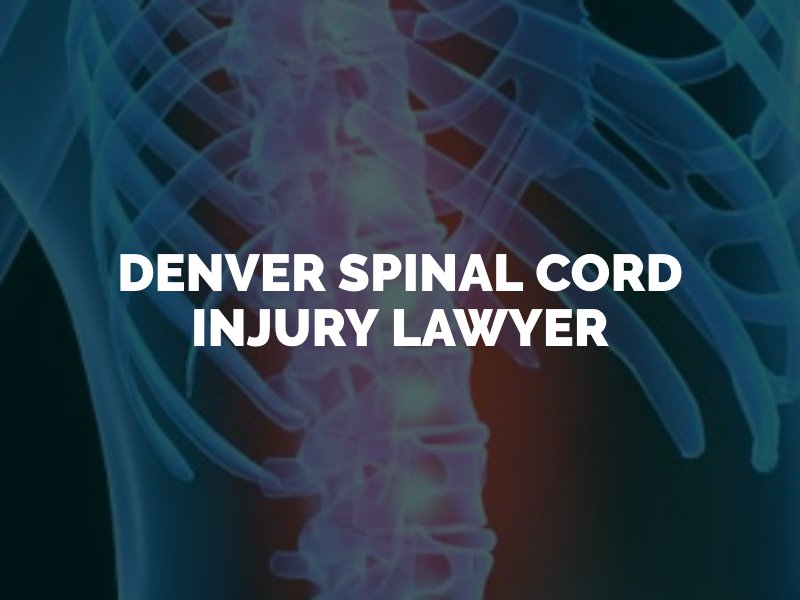Spinal cord injuries can have life-changing consequences for victims. If you have suffered spinal cord injury through the negligence or wrongdoing of another, contact Fang Law Firm in Denver. Our experienced Denver spinal cord injury lawyers can assist you in holding responsible parties accountable and pursuing fair compensation for your losses.

If you or a loved one sustained a spinal cord injury in any type of accident, contact Fang Law Firm for a free case review. Our Denver spinal cord injury lawyers can determine whether someone else caused your injury and therefore may be liable for your damages. If so, we can help you recover compensation.
Going through your spinal cord injury claim alone can put you at risk of an insurance company taking advantage of you. Insurance carriers are known for putting their bottom lines over their clients. This is especially true during catastrophic injury claims, such as paralysis lawsuits, as they are worth more money.
Hiring an attorney levels the playing field and ensures that you are treated fairly. Your attorney can negotiate a fair and full settlement with an insurance claims adjuster on your behalf. If your case cannot reach a settlement, your lawyer can represent you during a spinal cord injury trial in Denver instead. Your lawyer will handle every complex aspect of your case so that you can focus on rebuilding your life.
Once you are on a treatment plan for your spinal cord injury, contact a spine injury lawyer to discuss a potential personal injury claim in Denver. Pursuing an insurance claim or a personal injury lawsuit could lead to compensation for your damages. Spine injury claims can be worth a significant amount depending on how greatly they impact accident victims’ lives. For instance, paralyzing spine injuries that require home care can garner awards of $1 million or more for the victim’s lifetime disability and related losses.
People living with spine injuries often require significant disability accommodations or around-the-clock care. Each spine injury case is different, however. The only way to find out what your case could be worth in Colorado is by contacting a spinal cord injury attorney.
A successful insurance settlement or spinal cord injury lawsuit in Denver could lead to financial compensation for many different damages. Damages refer to the physical, emotional and financial losses you incurred due to your injury. You could receive an award to cover your past and future medical bills, surgeries, rehabilitation, 24/7 care, home care or vehicle modifications, lost wages, lost capacity to earn due to a disability, pain and suffering, property damages, lost quality of life, mental anguish, loss of consortium, and wrongful death damages if a loved one died.
In Colorado, there is a strict deadline on your ability to file a spinal cord injury lawsuit. This deadline, known as the statute of limitations, applies to most personal injury cases. It is two years from the date that the injury was sustained or discovered, with some exceptions. If the victim is a minor, the victim often has two years from the date that he or she turns 18 to file, instead. If you wish to bring a wrongful death case with the help of a Denver wrongful death lawyer for a fatal spine injury, your family has two years from the date of death to file.
There are some exceptions to Colorado’s statute of limitations. If the spine injury was caused by a motor vehicle accident, for instance, the deadline is extended to three years. However, if you wish to bring a claim against a government agency in Colorado, you only have 180 days to file your notice. If your statute of limitations has expired, the other side of your case can use this as a defense to liability for your spinal cord injury. This is why you should discuss your case with an experienced attorney in Denver as soon as possible.

The spinal cord is the cylindrical bundle of nerve fibers and tissue enclosed in the spine. The spinal column contains 33 bones known as vertebrae, separated by soft, cushiony disks. It connects nearly every part of the body to the brain, with which it forms the central nervous system. The spinal cord is responsible for controlling bodily functions, sensations and movement. It does this with messages that travel from the brain to the body.
Damage to the spinal cord can be life-threatening. Any injury to the spine or its surrounding elements, such as spinal cord discs, could lead to catastrophic injuries such as paralysis. The spine is the body’s support beam. It also houses a bundle of critical nerves that sends signals from the brain to the body. Damage to any part of the spinal cord can cause loss of strength, sensation, and body functions below the site of the injury. A spinal injury can be complete or incomplete.
All feeling and ability to control movement are lost below the site of the injury. A complete spinal cord injury means that the spine has been entirely severed and all communication between the brain and the body has been cut off (paralysis).
An incomplete spinal cord injury does not fully sever the spine. This means that some nerve signals are still transmitted and some motor or sensory function remains below the site of the injury. Incomplete spinal cord injury occurs in varying degrees.
In addition to categorizing a spinal cord injury as complete or incomplete, a physician will make a diagnosis of the specific injury type. This will inform the doctor’s approach to treating the injury and allow for a more accurate prognosis. The spine is a complex part of the body that can suffer damage in multiple ways in an accident. Examples of spinal cord injuries include:
Paralysis is the most severe type of spine injury. The lowest normal (undamaged or uninjured) part of the spinal cord is called the neurological level of the injury. Depending on the location of the injury on the spinal cord, paralysis may be referred to as tetraplegia or paraplegia.
Tetraplegia, also known as quadriplegia, affects the arms, hands, trunk, legs and pelvic organs. It typically arises from an injury to the uppermost part of the spine (the cervical spine) and affects the body from the neck down.
Paraplegia is paralysis from an injury to a lower part of the spine. It generally affects the legs and pelvic organs and all or part of the trunk.

Spinal injuries are caused by damage to the vertebrae, disks, or ligaments of the spine, or to the spinal cord itself. Traumatic spinal cord injury can occur with a traumatic blow to the spine that crushes, compresses, fractures, or dislocates one or more vertebrae. It may also be caused by a penetrating injury, such as a gunshot or knife wound.
Bleeding, swelling, inflammation, and accumulated fluid in and around the spinal cord usually cause additional damage for days or weeks following the injury. In some cases, an injured person may also experience brain damage, a traumatic brain injury, or chronic pain in conjunction with a spinal cord injury.
As stated by the Mayo Clinic, the most common causes of spinal cord injury in the U.S. are:
Additional causes of spinal cord injuries can include:
Most of these accidents and spinal cord injury risks are avoidable. They stem from negligence – the failure of a person or party to act with ordinary care, resulting in harm to others. If this is the case, the injured victim can file a spinal cord injury lawsuit against the at-fault party in pursuit of financial compensation. Our lawyers can carefully investigate your injury case to determine if your case has merit.
After an incident that impacts your spine, such as a fall, motor vehicle collision, diving accident gunshot wound or medical malpractice, you may notice signs of something amiss right away. It could also take a few hours or even days to notice the symptoms of a spine or back injury. Every patient and injury is unique.
If you notice any potential signs of a spinal cord injury after an accident, limit your movements. Remain where you are until paramedics arrive. Twisting or moving the wrong way could exacerbate your spine injury or create additional serious injuries. Go to the hospital immediately for a diagnosis and treatment. Keep copies of all your medical records to use during your case later.
Our Denver spinal cord injury attorneys know damages are high in spine injury cases. Medical care, rehabilitation costs, lost wages and lost earning capacity are just a few of the tangible losses you may have experienced. It is essential to hold responsible parties accountable and recover the compensation you deserve from insurance companies or liable parties.
Our attorneys can assess your case and damages during a free consultation at our local personal injury law firm. We have the experience to understand how significantly a spinal cord injury can impact the survivor and his or her loved ones. Our lawyers can present your damages to an insurer, judge or jury in a way that will maximize the odds of obtaining fair and full compensation. Discuss your personal injury case in more detail with a Denver spinal cord injury lawyer today.
Initial consultations at Fang Law Firm are free and confidential. Call or contact us online today to schedule a meeting in Denver.